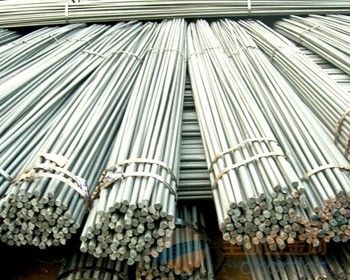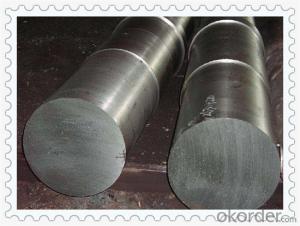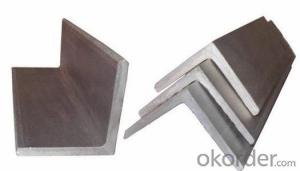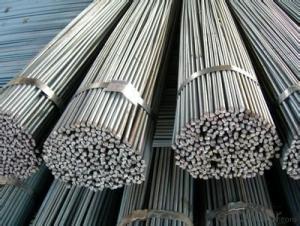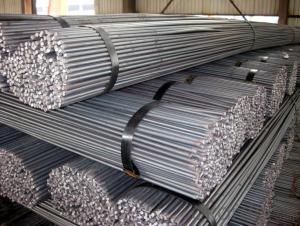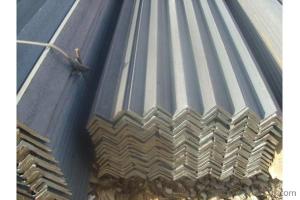Hot rolled round bar for construction Q235
- Loading Port:
- Tianjin
- Payment Terms:
- TT or LC
- Min Order Qty:
- 25 m.t.
- Supply Capability:
- 100000 m.t./month
OKorder Service Pledge
OKorder Financial Service
You Might Also Like
Product Description:
OKorder is offering hot rolled round bar for construction Q235 at great prices with worldwide shipping. Our supplier is a world-class manufacturer of steel, with our products utilized the world over. OKorder annually supplies products to European, North American and Asian markets. We provide quotations within 24 hours of receiving an inquiry and guarantee competitive prices.
Product Applications:
Hot rolled round bar are ideal for structural applications and are widely used in the construction of buildings and bridges, and the manufacturing, petrochemical, and transportation industries.
Product Advantages:
OKorder's round bar are durable, strong, and resist corrosion.
Main Product Features:
· Premium quality
· Prompt delivery & seaworthy packing (30 days after receiving deposit)
· Corrosion resistance
· Can be recycled and reused
· Mill test certification
· Professional Service
· Competitive pricing
Product Specifications:
1. Grade: GB, JIS, ASTM, EN
2. Grade: Q235, SS400, A36, S235JR
3. Diameter and mass: As below
Diameter | Mass | Diameter | Mass | Diameter | Mass |
(mm) | (kg/m) | (mm) | (kg/m) | (mm) | (kg/m) |
6 | 0.22 | 22 | 2.98 | 53 | 17.30 |
7 | 0.30 | 24 | 3.55 | 56 | 19.30 |
8 | 0.40 | 25 | 3.85 | 60 | 22.20 |
9 | 0.50 | 26 | 4.17 | 63 | 24.50 |
10 | 0.62 | 28 | 4.83 | 65 | 26.00 |
11 | 0.75 | 30 | 5.55 | 70 | 30.20 |
12 | 0.89 | 32 | 6.31 | 75 | 34.70 |
13 | 1.04 | 34 | 7.13 | 80 | 39.50 |
14 | 1.21 | 36 | 7.99 | 85 | 44.50 |
15 | 1.39 | 38 | 8.90 | 90 | 49.90 |
16 | 1.58 | 40 | 9.86 | 95 | 55.60 |
17 | 1.78 | 42 | 10.90 | 100 | 61.70 |
18 | 2.00 | 45 | 12.50 | 120 | 88.85 |
19 | 2.23 | 48 | 14.20 | 140 | 120.93 |
20 | 2.47 | 50 | 15.40 | 150 | 138.82 |
4. Material: Mild Steel
5. Heat treatment of high quality steel:
Fire: Isothermal annealing temperature is 800 ~ 880 °C, with 10 ~ 20 °C, the furnace cooling to about 600 °C, hardness above HB269.
Preheat temperature: 730-730 °C
Quenching temperature: 1190-1210 °C
Tempering temperature: 540-595 °C
Cold drawn, hardness 285 HBS
Cold drawn after annealing condition, hardness 277 HBS
Quenching methods: oil quenching, air cooling or salt bath quenching
Usage and Applications of High Quality Round Bar
1) Suitable for making various strong cutting tool abrasion resistance, impact resistance.
2) Used to produce all kinds of high hard and super hard saw blade, drill, tap, broach, gear hob and various kinds of milling cutter.
3) Used for advanced punching die, screw die, and the toughness and complicated shape of the punch, etc.
4) Is used for cold forging die and drawing mode, etc.
5) Recommended watchcase factory, screw factory and other cold stamping products industry use.
Packaging & Delivery of High Quality Round Bar
Packaging Detail: All goods are packed in bundle with steel strips and shipped by break bulk vessel or container (depend on target market and different ports)
Delivery Detail: 45 days
Trade terms: FOB, CFR, CIF
MOQ: 25 tons per specification; we can negotiate the quantity if the specification is normal or we have stock of one specification.
Weight: The price invoicing on theoretical weight basis or actual weight basis depends on customer’s request.
Shipment: The shipment of bulk break or container is depends on customer’s request and the situation of the port of destination.
Documents given: Full set of original clean on board bill of lading; Original signed commercial invoice; Original packing list; Policy of insurance; Certificate of origin and what the target market needs.
Production Flow of High Quality Round Bar
The common processes are preheated forging quenching, dual refinement solution process, cooling quenching and isothermal quenching. We use heat treatment for dual refinement solution process. The main measures process is high temperature solution and refinement cycle. High temperature solution can improve the carbide morphology and particle size. The aim is to make the loop refinement ultrafine austenite grains.
FAQ:
Q1: How do we guarantee the quality of our products?
A1: We have established an advanced quality management system which conducts strict quality tests at every step, from raw materials to the final product. At the same time, we provide extensive follow-up service assurances as required.
Q2: How soon can we receive the product after purchase?
A2: Within three days of placing an order, we will begin production. The specific shipping date is dependent upon international and government factors, but is typically 7 to 10 workdays.
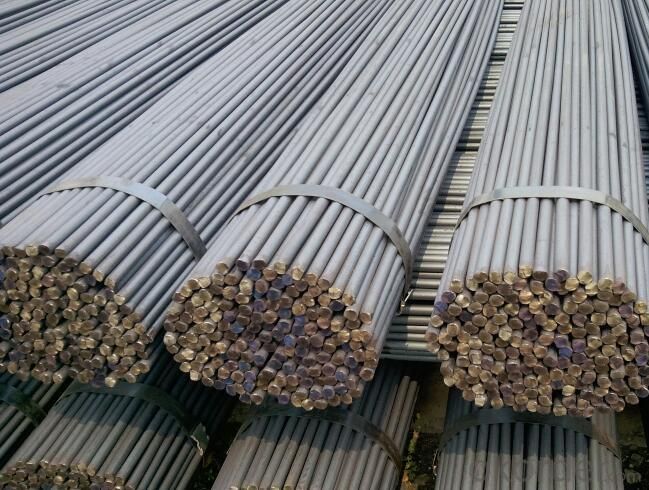
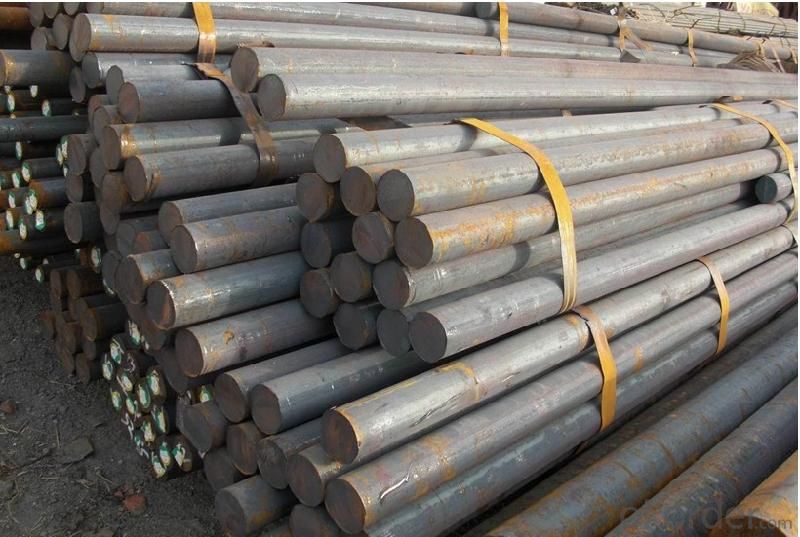
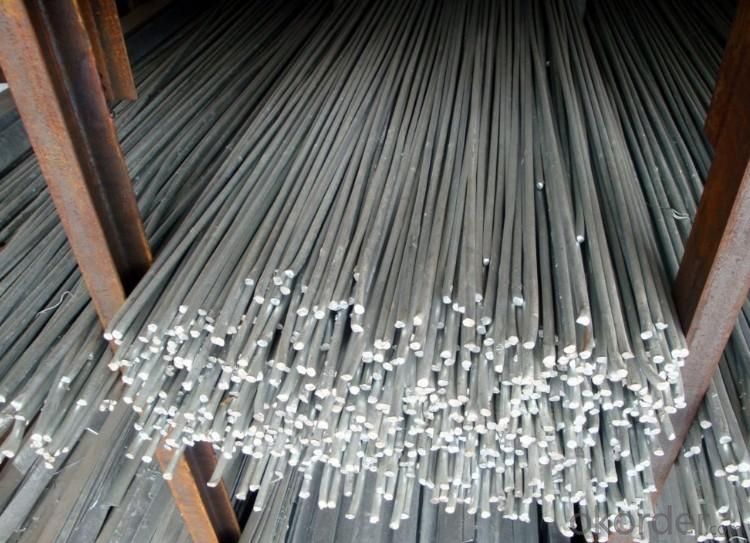
- Q: Can steel round bars be used in the production of musical instruments?
- Certainly! Musical instruments can indeed be produced using steel round bars. Steel, being a versatile material, possesses a wide array of desirable attributes including strength, durability, and resonance. Although wood is typically the go-to material for crafting musical instruments, steel can be utilized in specific instances to augment the instrument's sound and performance. For instance, steel round bars can be implemented in the fabrication of various components such as keys or valves for wind instruments like saxophones or trumpets. Moreover, these bars can be employed to construct the internal support systems in instruments like guitars or cellos, thereby providing stability and enriching tonal qualities. Furthermore, steel round bars can be employed in the construction of percussion instruments such as steel drums or xylophones, where their robust and resonant attributes are highly sought after. On the whole, although wood remains the more prevalent choice in the realm of musical instrument production, steel can certainly be employed in specific scenarios to attain desired sound characteristics and structural integrity.
- Q: What are the different types of steel round bar alloys?
- There are several different types of steel round bar alloys, including carbon steel, alloy steel, stainless steel, and tool steel.
- Q: How do steel round bars compare to titanium round bars?
- Steel round bars and titanium round bars have different properties and characteristics that make them suitable for different applications. Here is a comparison between the two: 1. Strength: Titanium round bars have a higher strength-to-weight ratio than steel round bars. This means that titanium can withstand higher loads and stresses while being lighter in weight compared to steel. However, steel round bars are generally stronger and more rigid than titanium, making them suitable for heavy-duty applications that require high strength. 2. Corrosion Resistance: Titanium round bars are highly resistant to corrosion, even in harsh environments such as saltwater. Steel, on the other hand, is susceptible to corrosion and requires additional protective measures (such as coatings or galvanization) to prevent rusting. Therefore, titanium round bars are preferred in applications where corrosion resistance is essential. 3. Density: Titanium round bars have a lower density compared to steel round bars. This low density makes titanium ideal for applications where weight reduction is crucial, such as aerospace and automotive industries. Steel round bars, with their higher density, are typically used in applications where weight is less of a concern. 4. Temperature Resistance: Titanium round bars have excellent heat resistance, retaining their mechanical properties at high temperatures. Steel round bars, however, can lose their strength and become brittle when exposed to high temperatures. Therefore, titanium round bars are suitable for applications that require elevated temperature resistance. 5. Cost: Steel round bars are generally more affordable than titanium round bars. Titanium is an expensive metal due to its scarcity and complex extraction process. The cost difference between the two materials can be significant, making steel round bars more favorable for budget-conscious projects. In conclusion, the choice between steel round bars and titanium round bars depends on the specific requirements of the application. Steel is preferred for its superior strength and affordability, while titanium offers advantages such as high strength-to-weight ratio, corrosion resistance, temperature resistance, and lower density.
- Q: Can steel round bars be used for making agricultural equipment?
- Yes, steel round bars can be used for making agricultural equipment. Steel round bars are known for their high strength and durability, making them suitable for heavy-duty applications in the agricultural industry. They can be used to manufacture various agricultural equipment such as plows, tillers, cultivators, harrows, and seeders. The strength of steel round bars allows these equipment to withstand the harsh conditions in the field, including the impact of rocks and hard soil. Additionally, steel round bars can be easily shaped and welded, providing flexibility in designing and customizing agricultural equipment according to specific requirements. Overall, steel round bars are a reliable and cost-effective material choice for making agricultural equipment due to their strength, durability, and versatility.
- Q: What are the safety precautions when handling steel round bars?
- When handling steel round bars, it is important to follow certain safety precautions. These include wearing appropriate personal protective equipment such as safety gloves, goggles, and steel-toed boots to protect against potential injuries. Additionally, workers should be trained on the correct lifting techniques to avoid strains or back injuries. It is crucial to inspect the bars for any defects or damages before handling them, as flawed bars can pose safety risks. Proper storage and handling techniques should be followed to prevent accidents such as tripping or falling. Lastly, communication and coordination among workers are essential to ensure a safe working environment when handling steel round bars.
- Q: Can steel round bars be used in the packaging industry?
- Yes, steel round bars can be used in the packaging industry. Steel round bars are commonly used in packaging to provide structural support and strength to various types of packaging materials. They can be used as reinforcement bars or support rods in packaging crates, pallets, and containers. Steel round bars are known for their high strength and durability, making them ideal for withstanding heavy loads and ensuring the integrity of the packaging during transportation and storage. Additionally, steel round bars can be easily customized and cut to the desired length, allowing for flexibility in packaging design and requirements. Overall, the use of steel round bars in the packaging industry helps to improve the safety, stability, and protection of packaged products.
- Q: What is the difference between carbon steel and alloy steel round bars?
- Both carbon steel and alloy steel round bars find extensive use across various industries, although they vary in terms of their composition and properties. In particular, carbon steel round bars consist predominantly of iron and carbon, with small amounts of other elements present. Depending on the grade, the carbon content typically ranges between 0.05% and 2.0%. These bars are renowned for their robustness and hardness, rendering them suitable for applications demanding high durability and resistance to wear. Additionally, carbon steel round bars possess excellent machinability, allowing them to be easily shaped and molded into desired forms. Nevertheless, they may exhibit limited resistance to corrosion, necessitating the application of additional protective coatings in corrosive environments. In contrast, alloy steel round bars are produced by incorporating various alloying elements into carbon steel. Such elements encompass manganese, chromium, nickel, molybdenum, and others. The inclusion of these elements augments the properties of the steel, including enhanced strength, toughness, and resistance to wear and corrosion. Alloy steel round bars are frequently selected for applications demanding specific characteristics, such as resistance to high temperatures, a high strength-to-weight ratio, or improved machinability. In conclusion, the primary disparity between carbon steel and alloy steel round bars lies in their composition and resulting properties. Carbon steel round bars primarily consist of iron and carbon, offering commendable strength and hardness; however, they may exhibit limited resistance to corrosion. Conversely, alloy steel round bars incorporate supplementary alloying elements, bolstering specific properties like increased strength, toughness, and corrosion resistance. The selection between carbon steel and alloy steel round bars hinges upon the precise requirements of the application at hand.
- Q: Can steel round bars be used for making tie rods?
- Yes, steel round bars can be used for making tie rods.
- Q: Can steel round bars be used in the electronics industry?
- Yes, steel round bars can be used in the electronics industry. They are commonly used for various applications such as providing structural support, heat dissipation, and grounding in electronic devices and equipment. Additionally, steel round bars offer excellent strength, durability, and conductivity, making them suitable for use in the electronics industry.
- Q: What are the advantages of using aluminum-alloy steel round bars?
- There are several advantages of using aluminum-alloy steel round bars. Firstly, aluminum-alloy steel round bars offer excellent strength-to-weight ratio. The combination of aluminum and steel provides a lightweight yet strong material, making it suitable for various applications. This advantage is particularly important in industries such as aerospace and automotive, where weight reduction is crucial for fuel efficiency and performance. Secondly, aluminum-alloy steel round bars have high corrosion resistance. Aluminum forms a protective oxide layer when exposed to air, which prevents further corrosion. This property makes them suitable for outdoor applications or environments where exposure to moisture or chemicals is common. Additionally, aluminum-alloy steel round bars are highly malleable and can be easily machined or formed into different shapes. This versatility allows for the production of complex parts and components, making them ideal for industries such as construction and manufacturing. Furthermore, aluminum-alloy steel round bars have excellent thermal and electrical conductivity. This makes them a preferred choice for applications that require heat dissipation or electrical conduction, such as heat sinks or electrical connectors. Lastly, aluminum-alloy steel round bars are highly recyclable. Aluminum is one of the most recycled materials in the world, with a recycling rate of over 90%. This not only reduces the environmental impact but also offers cost savings in material sourcing. In summary, the advantages of using aluminum-alloy steel round bars include their excellent strength-to-weight ratio, high corrosion resistance, malleability, thermal and electrical conductivity, and recyclability. These properties make them a valuable choice for a wide range of applications in various industries.
Send your message to us
Hot rolled round bar for construction Q235
- Loading Port:
- Tianjin
- Payment Terms:
- TT or LC
- Min Order Qty:
- 25 m.t.
- Supply Capability:
- 100000 m.t./month
OKorder Service Pledge
OKorder Financial Service
Similar products
Hot products
Hot Searches
Related keywords



